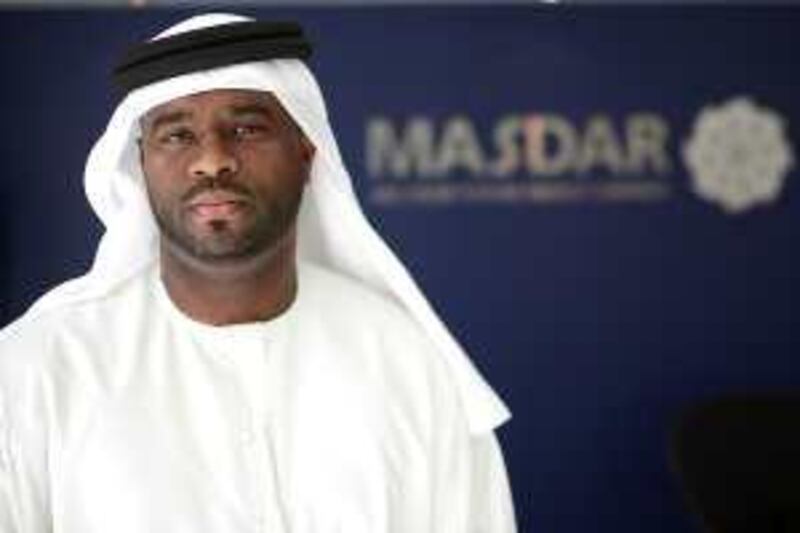In a land awash with oil, his was an obvious career choice. But Bader al Lamki changed course. Now he is pursuing greener ways of generating power. Hugh Naylor reports Were it not part of a national effort to transform the way the world powers itself, Bader al Lamki's recent career change could be described as unusual. Not long ago, the 35-year-old engineer was on an offshore oil platform, working to extract the sort of fossil fuels blamed for contributing to global warming.
Now, as a senior researcher at Masdar City, the multibillion-dollar Abu Dhabi initiative to promote environmentally friendly energy, he is working to wean the world, including the UAE, off those very hydrocarbons. It is a job he describes as "diametrically" different to his previous role, and one that has also given him a sense of moral purpose. "Climate change is a global phenomenon, and there's nothing more exciting than to be part of a group of people who are trying to provide solutions which are important for humankind," he says.
One small part of the solution is the 400-megawatt, low-carbon power plant that he and his team of 35 Masdar specialists are designing. The idea is to manipulate natural gas by first stripping it of its heat-trapping carbon dioxide (CO2) vapours and then using the leftover hydrogen as fuel for the power plant. The remaining CO2 would then be stored in a reservoir, instead of being emitted into the atmosphere, as is the case with conventional methods.
He thinks the project could have profound practical applications, especially in the developing world. There, power generation that is usually reliant on relatively "dirty" fuels such as coal, is expected to increase dramatically. "I believe this project will be a stepping stone towards a clean coal power-generation plant," says Mr al Lamki. "The majority of coal plants, if you look at India, China, they're still emitting very high volumes of CO2. But if you can strip it of the CO2, you can [have] a coal-based plant with reduced emissions."
As well as a personal transformation, his transfer to the Masdar project in 2008 also represents an initial tangible result of a national drive to move the economy away from its dependence on oil. This, it is envisaged, will also provide an escalation of opportunities for Emirati engineers, who traditionally have gravitated towards the oil and gas sector. Mr al Lamki's move into "clean energy" is an example of what both he and the leadership hope will become a trend.
"The whole economy is being diversified, and there are enormous opportunities for UAE nationals to pursue science and engineering," he says Mr al Lamki. He would like to see today's young Emiratis follow his lead: "I'm not saying that they should drop art, but given the era that we're in, and the opportunities, I think getting into engineering is something wise to consider." Such diverse opportunities were not as widely available when Mr al Lamki, who lives in Al Ain with his wife and three children, first entered the job market. After graduating from UAE University in Al Ain with a degree in chemical engineering, he followed a route that was typical of many Emiratis who studied engineering. "I made the choice to get into chemical engineering," he says, "primarily because the UAE is one of the largest oil and gas producers and is a major player in the energy arena.
"The oil and gas sector was really the main driver towards encouraging Emirati nationals to get into engineering." That led him first, in 1991, to Abu Dhabi Marine Operating Company, a subsidiary of the Abu Dhabi National Oil Company that specialises in offshore oil and gas production. There, as a process engineer, his duties focused on how best to refine and transport crude oil. He then moved to corporate planning, carrying out long-term conceptual studies for the company. He also spent a year's secondment in Paris, working for the French energy firm Total.
Although he says Abu Dhabi's oil and gas sector provided him with invaluable experience, he moved to Masdar, in part, because he hungered for something new. That has translated into almost two years of 12-hour workdays, dedicated to getting Masdar's low-carbon reactor, or Hydrogen Power Plant Abu Dhabi, up and running. It may soon be a reality, says Mr al Lamki. "We are now at a stage whereby we have design, drawings, configurations. We're just finalising residual engineering work and, hopefully, if all goes well, beginning next year we can start tendering for the next phase of construction."
It's a proud achievement. But perhaps just as rewarding, he says, is working with a team that includes almost a dozen Emiratis. Now, the next step to is to increase that number. "There has been good encouragement for Emirati engineers," he says, "and now there is even more opportunity. Now we are in an era where the economy has been diversified, with new vehicles to help diversify it. "That puts even more pressure on Emirati nationals to get on board."
hnaylor@thenational.ae






